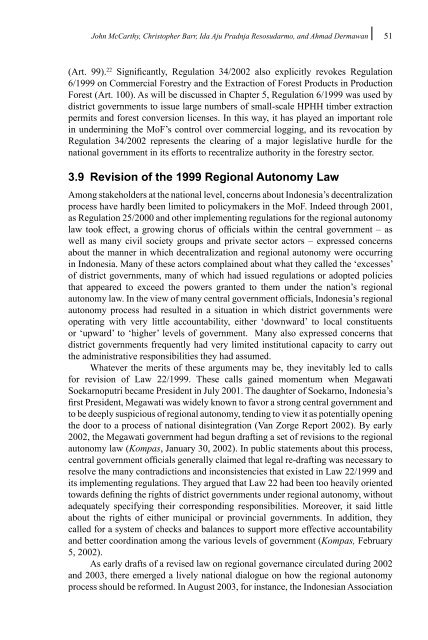Decentralization of Forest Administration in Indonesia, Implications ...
Decentralization of Forest Administration in Indonesia, Implications ...
Decentralization of Forest Administration in Indonesia, Implications ...
Create successful ePaper yourself
Turn your PDF publications into a flip-book with our unique Google optimized e-Paper software.
John McCarthy, Christopher Barr, Ida Aju Pradnja Resosudarmo, and Ahmad Dermawan 51<br />
(Art. 99). 22 Significantly, Regulation 34/2002 also explicitly revokes Regulation<br />
6/1999 on Commercial <strong>Forest</strong>ry and the Extraction <strong>of</strong> <strong>Forest</strong> Products <strong>in</strong> Production<br />
<strong>Forest</strong> (Art. 100). As will be discussed <strong>in</strong> Chapter 5, Regulation 6/1999 was used by<br />
district governments to issue large numbers <strong>of</strong> small-scale HPHH timber extraction<br />
permits and forest conversion licenses. In this way, it has played an important role<br />
<strong>in</strong> underm<strong>in</strong><strong>in</strong>g the MoF’s control over commercial logg<strong>in</strong>g, and its revocation by<br />
Regulation 34/2002 represents the clear<strong>in</strong>g <strong>of</strong> a major legislative hurdle for the<br />
national government <strong>in</strong> its efforts to recentralize authority <strong>in</strong> the forestry sector.<br />
3.9 Revision <strong>of</strong> the 1999 Regional Autonomy Law<br />
Among stakeholders at the national level, concerns about <strong>Indonesia</strong>’s decentralization<br />
process have hardly been limited to policymakers <strong>in</strong> the MoF. Indeed through 2001,<br />
as Regulation 25/2000 and other implement<strong>in</strong>g regulations for the regional autonomy<br />
law took effect, a grow<strong>in</strong>g chorus <strong>of</strong> <strong>of</strong>ficials with<strong>in</strong> the central government – as<br />
well as many civil society groups and private sector actors – expressed concerns<br />
about the manner <strong>in</strong> which decentralization and regional autonomy were occurr<strong>in</strong>g<br />
<strong>in</strong> <strong>Indonesia</strong>. Many <strong>of</strong> these actors compla<strong>in</strong>ed about what they called the ‘excesses’<br />
<strong>of</strong> district governments, many <strong>of</strong> which had issued regulations or adopted policies<br />
that appeared to exceed the powers granted to them under the nation’s regional<br />
autonomy law. In the view <strong>of</strong> many central government <strong>of</strong>ficials, <strong>Indonesia</strong>’s regional<br />
autonomy process had resulted <strong>in</strong> a situation <strong>in</strong> which district governments were<br />
operat<strong>in</strong>g with very little accountability, either ‘downward’ to local constituents<br />
or ‘upward’ to ‘higher’ levels <strong>of</strong> government. Many also expressed concerns that<br />
district governments frequently had very limited <strong>in</strong>stitutional capacity to carry out<br />
the adm<strong>in</strong>istrative responsibilities they had assumed.<br />
Whatever the merits <strong>of</strong> these arguments may be, they <strong>in</strong>evitably led to calls<br />
for revision <strong>of</strong> Law 22/1999. These calls ga<strong>in</strong>ed momentum when Megawati<br />
Soekarnoputri became President <strong>in</strong> July 2001. The daughter <strong>of</strong> Soekarno, <strong>Indonesia</strong>’s<br />
first President, Megawati was widely known to favor a strong central government and<br />
to be deeply suspicious <strong>of</strong> regional autonomy, tend<strong>in</strong>g to view it as potentially open<strong>in</strong>g<br />
the door to a process <strong>of</strong> national dis<strong>in</strong>tegration (Van Zorge Report 2002). By early<br />
2002, the Megawati government had begun draft<strong>in</strong>g a set <strong>of</strong> revisions to the regional<br />
autonomy law (Kompas, January 30, 2002). In public statements about this process,<br />
central government <strong>of</strong>ficials generally claimed that legal re-draft<strong>in</strong>g was necessary to<br />
resolve the many contradictions and <strong>in</strong>consistencies that existed <strong>in</strong> Law 22/1999 and<br />
its implement<strong>in</strong>g regulations. They argued that Law 22 had been too heavily oriented<br />
towards def<strong>in</strong><strong>in</strong>g the rights <strong>of</strong> district governments under regional autonomy, without<br />
adequately specify<strong>in</strong>g their correspond<strong>in</strong>g responsibilities. Moreover, it said little<br />
about the rights <strong>of</strong> either municipal or prov<strong>in</strong>cial governments. In addition, they<br />
called for a system <strong>of</strong> checks and balances to support more effective accountability<br />
and better coord<strong>in</strong>ation among the various levels <strong>of</strong> government (Kompas, February<br />
5, 2002).<br />
As early drafts <strong>of</strong> a revised law on regional governance circulated dur<strong>in</strong>g 2002<br />
and 2003, there emerged a lively national dialogue on how the regional autonomy<br />
process should be reformed. In August 2003, for <strong>in</strong>stance, the <strong>Indonesia</strong>n Association

















